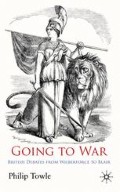Abstract
Public opinion is the summation of all the influences previously described and polls suggest that, while British people are unfamiliar with the theories of armchair strategists or of military leaders, they usually take a balanced, commonsensical view of intervention because of the ways their ideas have been shaped by their own experiences and their history.1 It is also clear that popular British attitudes have been far more cautious than intellectuals have allowed.
Access this chapter
Tax calculation will be finalised at checkout
Purchases are for personal use only
Preview
Unable to display preview. Download preview PDF.
Notes
Sir Charles Petrie, Twenty Years’ Armistice-And After: British Foreign Policy since1918 (London, Eyre and Spottiswoode, 1940), p. 190.
Public Opinion Quarterly, loc cit.; George H. Gallup, The Gallup International Public Opinion Polls: Great Britain 1937–1975 (New York, Random House, 1976), Volume 1, pp. 1–10. Many of the early polls only count those who responded and ignore the ‘don’t knows’, thus distorting the proportions supporting various opinions.
Aldous Huxley, Ends and Means: An Enquiry into the Nature of Ideals and into the Methods employed for their Realisation (London, Chatto and Windus, 1938).
Ibid., p. 41. For attitudes towards the Churchill government, see Public Opinion Quarterly, 1942, p. 156. See also John Charmley, Churchill: The End of Glory (New York, Harcourt Brace, 1993), Chapters 42 and 43.
John E. Mueller, War, Presidents and Public Opinion (New York, John Wiley, 1973), pp. 270–274.
Richard Sobel, The Impact of Public Opinion on US Foreign Policy since Vietnam (New York, Oxford University Press, 2001), p. 14. See also Ole R. Holsti’s comments, p. ix.
Francis A. Beer, Peace Against War: The Ecology of International Violence (San Francisco, W. H. Freeman, 1981), p. 16.
Viscount d’Abernon, An Ambassador of Peace (Hoddern and Stoughton, London, 1929).
Author information
Authors and Affiliations
Copyright information
© 2009 Philip Towle
About this chapter
Cite this chapter
Towle, P. (2009). The Public Debate. In: Going to War. Palgrave Macmillan, London. https://doi.org/10.1057/9780230234314_10
Download citation
DOI: https://doi.org/10.1057/9780230234314_10
Publisher Name: Palgrave Macmillan, London
Print ISBN: 978-0-230-23793-3
Online ISBN: 978-0-230-23431-4
eBook Packages: Palgrave History CollectionHistory (R0)

